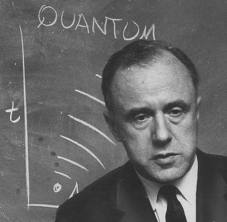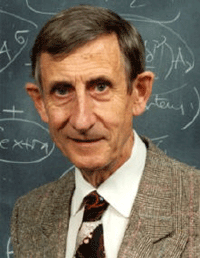 European Rationalism * "Our Pub" Library
European Rationalism * "Our Pub" Library It from bit? by Witold Marciszewski |
|
John Archibald
Wheeler,1911-2008 (on left), a celebrated professor at Princeton
University, worked with Niels Bohr and Albert Einstein, tutored several
generations of eminent physicists, had enormous contributions to quantum
theory, displayed an astonishingly imaginative spirit, and got famous for
having coined some intriguing catchy concepts; among them such as "black
hole", and that used in this page's title: It from bit.
Wheeler used to utter this maxim without adding any
interrogation sign, claiming thereby that the universe does consist of
discrete entities as are bits. However, in some other contexts he wondered
whether such discreteness of the universe might be reconciled with the
undeniable continuity of time. This was like adding the question sign to
his maxim. When so completed, his maxim is able to express both
the main tenet and the main problem of informational worldview. The
tenet runs as follows: information forms the core of reality. The
problem is following: whether information processing is always digital
(discrete), or must it sometimes be analog (continuous)?
This problem is a point of strong controversy among
different orientations within the informational worldview. While Wheeler is
a prominent follower of digital orientation, another famous physicist,
Freeman Dyson, vigourously defends the necessity of analog
information processing.
One may regard as unusual that a worldview contains not only
assertions but also questions or doubts. However, if we agree that some
questions may enjoy a cognitive value as some assertions do, there appears
no obstacle that problems be essential parts of a worldview. All this having
in mind, we get ready to agree that Wheeler's saying completed with question
sign does express the point of informational worldview.
Two key concepts occurring above have also a shorter
wording - of which we take advantage throughout the blog. These are as
follows.
However, shortenings happen to have a price to be paid --
loss on clarity. Therefore some comments are in order to restore the
clarity we need.
The word stem "world", as equivalent with "universe" and
"reality", directs our attention to the issue we are to have in focus, to
wit information and the structure of reality -- to use
David Deutch's and
Tom Stonier's phrases.
As to the phrase "informational philosophy", used interchangeably with
"philosophy of information", an instructive discussion is found in the
collection "Cyberphilosophy. The Intersection of Computing and Philosophy",
(edited by James H.~Moor and Terrel Ward Bynum, Blackwell 2002), in Chapter
9 (p.~133) entitled
"What is the Philosophy of Information", by Luciano Floridi.
The term
informatism Such a cluster of themes proves to be much in vogue, as
witnessed by the fact that there has appeared in Web
The Blackwell guide to the philosophy of computing and
information. Whether the term "informational philosophy" or
"informational worldview" happens to be used, there is a lot of common issues to be
inquired with success under either of these signboards.
There exist two notions of computing which are by no means
equivalent. In the latter case the function, its arguments and its
value are always rendered with some inscriptions (at a sheet of paper, at a
silicon chip, etc). In the analog case, the value of a function amounts to a
state of affairs (in nature,mind, or society) which maps another state of
affairs (a set of arguments) according to a deterministic law (of nature, of
mind, of society).
This distiction is critical for distinguishing digital
computing and analog computing. The latter is no computing in the narrower
sense, just the digital computing satisfies the definition. Nevertheless,
analog procedures deserve to ba called computations in the broader sense --
the one which embraces both the domain of analog and the domain od digital.
When speaking of information processing as being computational, we refer to
the broader concept of computing. Thus the equation as put above constitutes
the claim for the acceptance of the broader notion of computing. Those who
comply with that claim may be called dualists, as admitting two
varieties of computing, while those sticking to the narrower notion -- as
the unique to be acknowledged as proper -- deserve to be called
monists. Such a monism and such a dualism are both varieties of
informational worldview, if only they acknowledge points 1-3 as listed in
the previous Section.
The worldview hold in this blog is
informational-dualistic. It is meant as a starting point for discussion.
Obviously, it may change in a discussion, if relevant arguments are given.
|
 §1. On enjoying opposite inspirations
§1. On enjoying opposite inspirations